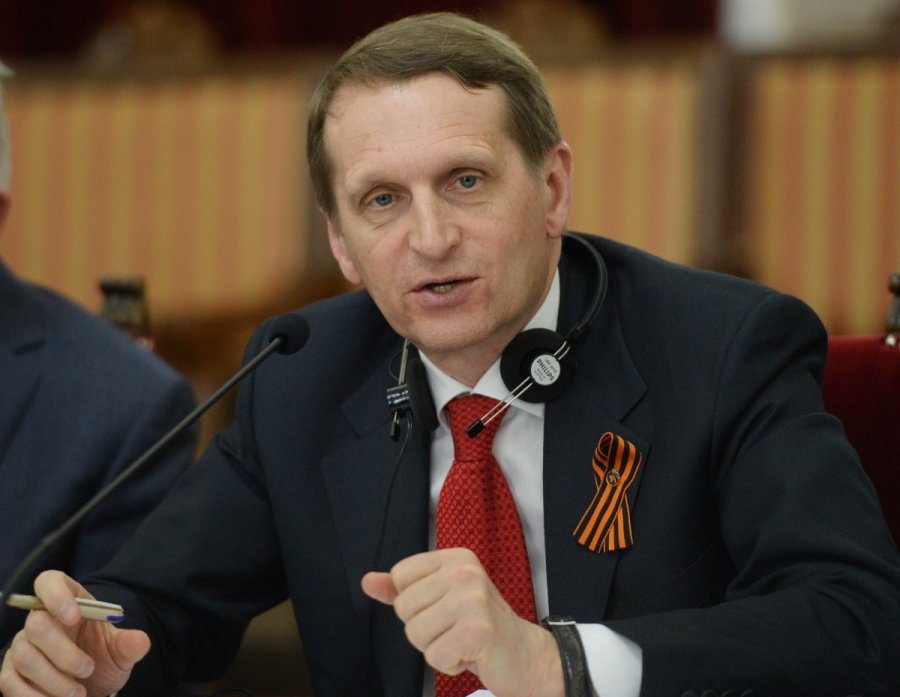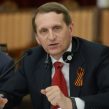
August in Donbas: Will the War Spread?
Publication: Eurasia Daily Monitor Volume: 12 Issue: 153
By:

The speaker of the Duma (Russian lower house of parliament), Sergei Naryshkin, published an article in the government daily Rossiyskaya Gazeta this week (August 9), making dark predictions about August and attacking the United States for being a global menace. The month of August, he writes, has traditionally featured evil happenings and wars in the past, and these could occur again soon because of US “provocations.” Naryshkin recalls the “provocations” that sparked World War I (August 1914), the nuclear bombs dropped on Hiroshima and Nagasaki (August 1945), fighting in Dagestan (August 1999) that began the Second Chechen war, as well as the August 2008 war between Russia and Georgia, “initiated by the US stooge Mikhail Saakashvili, who is now spreading havoc as governor of Odesa.” The style of Naryshkin’s article is cryptic and emotional. It is not clear whether the author actually blames the United States for secretly initiating the Great War in 1914, but he pins down the present-day evildoers without mincing his words: “The US will surely not rest; it will be turning people into zombies with false propaganda, attempt to use the [United Nations] Security Council and spread anti-Russian feelings in Europe.” Naryshkin explains that the US is overburdened by massive foreign debt (apparently equating national debt to foreign debt) and is out to plunder the wealth of Russia and others nations: The euro is being destroyed and European allies are punished by anti-Russian sanctions imposed by the US (Rossiyskaya Gazeta, August 9).
“August 2015 has begun, but it is not over,” continues Naryshkin, “A crisis is being prepared, but we will not succumb to provocation. The US president must remember: Who sows a wind will reap the storm.” According to Naryshkin, an international tribunal must be established to court-martial the evildoers and “we will live to see that happen” (Rossiyskaya Gazeta, August 9). Last week, Naryshkin called for an international tribunal to bring the US to justice for dropping atomic bombs on Japan, in 1945 (Polit.ru, August 5).
Naryshkin (60), is a long-time confidant of President Vladimir Putin, Both men are close to the same age, come from St. Petersburg, and share a career background in the Soviet KGB. From May 2008 to December 2011, when Putin temporarily became prime minister and legally left the presidency to Dmitry Medvedev, Naryshkin was appointed chief of the presidential administration in an apparent mission to preemptively neutralize Medvedev’s Kremlin and ensure that Putin continues to be in charge. Naryshkin’s recent statement in Rossiyskaya Gazeta may seem exotic, but it surely reflects the world view of Putin and his inner circle. The flamboyant nationalist demagogue Vladimir Zhirinovsky (69) is known for his keen understanding of the Kremlin’s political moods; this has allowed him to maintain a faction in the Duma for over 20 years—never in executive power, but still enjoying influence and money. Zhirinovsky backed Naryshkin’s anti-American outburst with a similar broadside, published on the website of his counter-intuitively named Liberal-Democratic Party of Russia (LDPR). Zhirinovsky “warns” Western countries not to “wake the Russian bear” and not to try to take over “parts of Russia,” including the “heroic Donbas” in eastern Ukraine. If provoked, according to Zhirinovsky, Russia will “destroy your cities, and only ashes will remain” (Ldpr.ru, August 10).
In a recent interview, Putin spoke with less emotion and hyperbole, but the overall message was clear. Putin accused “unfair and thoughtless people” of ranting about a “Russian military threat,” while, in fact, the Kremlin is merely defending its national interests. Putin expressed “hope” a new war in Europe could be avoided, if “Europe becomes more independent and sovereign in defending its national interests,” implying that, at present, everything is decided in Washington. Putin accused the US of “imperialism,” but explained his statement was “not anti-American,” just a factual observation (Kremlin.ru, July 27).
These apocalyptical predictions and threats may be connected with the apparent turning point in the Ukrainian crisis this August. An escalation of fighting is happening that could further worsen East-West relations. Naryshkin is a permanent member of the Security Council of the Russian Federation—a body Putin regularly uses to approve and take collective responsibility for ultimate decisions, like the occupation and annexation of Crimea. If a decision to begin a new summer offensive in Donbas has been taken, Kremlin elites may be venting their anxiety of the possible repercussions, while at the same time sending a strong message to Western leaders: Russia is ready to do what it takes to defend its national interests, as Putin understands them, while the West better stand down.
On August 3, at a press conference in a lavish hotel in downtown Moscow, a group of Ukrainian politicians that fled the country after the Maidan revolution in February 2014, presented a “Committee of Ukrainian salvation” led by former long-term prime minister Mykola Azarov. The Committee members told journalists they will stop the war in Donbas after taking power by withdrawing troops to their barracks and begging the Russia-backed separatists to forgive Kyiv. Ukraine would be transformed into a loose federation, and Crimea would be recognized as Russian. The present regime in Kyiv must be overthrown, Azarov’s group said, and a close partnership with Moscow restored (Interfax, August 3). The Kremlin announced it did not organize the Committee, but may decide to support it after “looking into its plans and opinions.” According to the Kremlin’s official spokesman, Dmitry Peskov, the present government in Kyiv is destroying Ukraine, and “this is against Russian national interests” (Dni.ru, August 3). Azarov specifically distanced himself from his former boss, former president Viktor Yanukovych, who was overthrown by the Maidan. Yanukovych is seen by many Russian nationalists as a traitor or coward who ran instead of sending tanks to suppress the Maidan. Rossiya-1 state TV’s main evening news program, Vesti, described the Committee as a “government in exile” (Vesti, August 3).
The supreme Ukrainian military command (General Staff) announced the rebel forces in Donbas are massing armor and troops for an overall attack, “while accusing the Ukrainian military of preparing to attack.” The Ukrainian General Staff announced: “We are calm and ready for anything” (Ukrainska Pravda, August 12). The main ceasefire negotiator of the rebel Donetsk People’s Republic (DNR), Denis Pushilin, told journalists: Kyiv authorities are provoking a military confrontation; and if it begins, there will be no more talks and “no new Minsk Three peace agreement.” According to Pushilin, if the fighting escalates “into full-blown military action, other parties may become dragged into the conflict that may evolve into a new world war” (Interfax, August 12).




